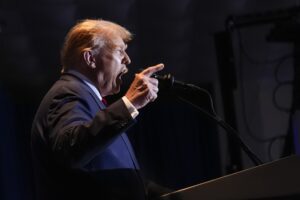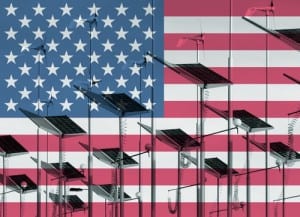The aligning interests between Russian President Vladimir Putin, Russia’s choice for U.S. president (Donald Trump), and Big Oil represents the gravest threat to humanity (and democracy) since the rise of the Axis powers in the 1930s.
That’s because while Trump may not be able to destroy global climate action and the landmark 2105 Paris climate deal all by himself — as he pledged to do during the campaign — he probably could do that with help from Russia and the trillion-dollar oil industry.
So much is explained by Trump’s Secretary of State choice. Media reports now say it will be Rex Tillerson, CEO of oil giant ExxonMobil, which had made a $500 billion oil deal with Putin that got blocked by sanctions.
Stalling the biggest oil deal ever did not just “put Exxon at risk,” as the Wall Street Journal reported in 2014. MSNBC’s Rachel Maddow explained last week this deal was so big it was “expected to change the historical trajectory of Russia.”
This deal could explain why Putin appears to have interfered in U.S. elections in favor of a Trump victory. Recently, “the C.I.A. altered its formal assessment of Russia’s activities to conclude that the government of President Vladimir V. Putin was not just trying to undermine the election,” as the New York Times reported Saturday, “but had also acted to give one candidate an advantage.”
You can certainly make a plausible case, as many have, that Putin had enough motivation to interfere simply to undermine the legitimacy of U.S. elections.
 On the other hand, it was always a little puzzling that Putin seemed to so admire a guy who had pledged to fully open the on-shore and off-shore spigots of U.S. domestic oil (and gas) drilling. After all, the end result of those policies would inevitably be a lower price for oil and gas, which compose the single biggest source of revenue for Russia. That’s why we saw headlines from January like, “Oil Price Collapse Pushing Russia’s Economy To The Edge” and from October like, “Why U.S. Oil Production Trumps Any Russian-OPEC Deal.”
On the other hand, it was always a little puzzling that Putin seemed to so admire a guy who had pledged to fully open the on-shore and off-shore spigots of U.S. domestic oil (and gas) drilling. After all, the end result of those policies would inevitably be a lower price for oil and gas, which compose the single biggest source of revenue for Russia. That’s why we saw headlines from January like, “Oil Price Collapse Pushing Russia’s Economy To The Edge” and from October like, “Why U.S. Oil Production Trumps Any Russian-OPEC Deal.”
But for Putin and the kleptocrats who benefit from his rule, little matters more than enriching coffers right now. It is no coincidence that just last week, Putin revealed Russia had sold a 19.5 percent stake in the Kremlin-controlled oil giant Rosnet for $11.3 billion to Qatar and others, “confounding expectations that the Kremlin’s standoff with the West would scare off major investors,” as Fortune reported in a must-read piece that connects major pieces of this puzzle.
“Just a few weeks ago, most industry watchers had written off the chances of a foreign investor being found for Rosneft,” Fortune reports. But this deal, the biggest oil deal of 2016, “pointed to a possible reassessment by foreign investors of the risks of dealing with Russia, at a time when the election of Donald Trump as U.S. president has heightened expectations of a thaw between Moscow and Washington.”
And how does Putin benefit? That $11.3 billion goes to the Kremlin, not Rosneft. No wonder “Russian officials were jubilant that Rosneft had pulled off a deal which will deliver a large chunk of the cash they need to fill gaps in the state budget caused by an economic slowdown and sanctions” (per Reuters).
Kleptocracy — and apparently meddling with a foreign an election — looks like it pays very well.
And if the sanctions are lifted — something a new Secretary of State could help make happen — it would pay off big time for Exxon. As Bloomberg explained in an October piece, “Exxon Faces Collateral Damage From a New Cold War,” the company’s “project queue for 2018 onward is weighted to resources challenged by low prices or higher costs, such as LNG and oil sands.”

One final point: Some have argued “the Paris treaty will survive and thrive during the Trump era.” Certainly, if the rest of the world unites to meet their commitments to continually ratchet down carbon pollution, that’s possible.
But Putin has never liked the Paris agreement, because it would mean a large fraction of Russia’s fossil fuel reserves would remain in the ground, rather than bubbling up to provide vast revenue for the Kremlin. No surprise, then, that Putin’s greenhouse gas target “is one of the weakest put forward by any government, anywhere,” as Climate Action Tracker explains. It “lies significantly above emissions that would result from current policies.”
“What’s holding Russia back from ratifying Paris climate agreement?” asked one op-ed from late September. Russia’s news agency TASS explained“Russia will not fast-track ratification.” Could it possibly have been that Putin has been waiting to see the results of our election—results of which Russia was able to influence, according to the majority of U.S. intelligence reports?
As of December 12, the U.N. reports Russia still hasn’t ratified the deal. If the new President of the second largest emitter keeps his pledge to exit Paris, then the fifth largest emitter will have a great excuse to opt out, too.
Now imagine how much havoc Putin, Trump, and a new oily Secretary of State could wreak on future negotiations by coercing other countries not to keep making new pledges to ratchet down their emissions, which is the cornerstone of Paris’s strategy to avoid catastrophic climate change.
Lee Raymond, Tillerson’s predecessor at Exxon, once explained: “I’m not a U.S. company and I don’t make decisions based on what’s good for the U.S.” Why should our new Secretary of State feel any differently?
Source: ThinkProgress. Reproduced with permission.











